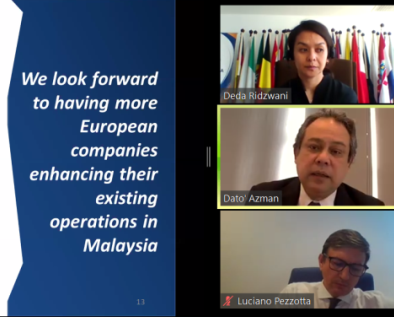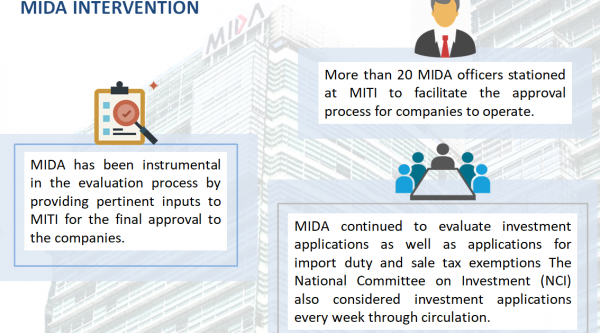
This site
is mobile
responsive

Malaysia’s move to break the chain of infections through the implementation of the Movement Control Order (MCO) beginning 18 March 2020 is proving to be effective with Malaysia handling the situation relatively well. In tandem, to ensure the resilience of the country’s economy, most of the economic sectors have been allowed to operate subject to strict adherence to health and safety guidelines.
The Ministry of International Trade and Industry (MITI) was at the forefront in providing the necessary approval for companies producing essential products and services to stay in operation during the MCO period conditionally.
“The Malaysian Investment Development Authority (MIDA) has been instrumental in the evaluation process by providing pertinent inputs to MITI for the final approval to the companies. While many of us work from home since the beginning of MCO, we had many MIDA officers stationed at MITI, around the clock, to facilitate the approval process for companies to operate. During MCO, MIDA continued to evaluate investment applications as well as applications for import duty and sales tax exemptions.
The National Committee on Investment (NCI) also considered investment applications every week through circulation,” said Dato’ Azman Mahmud, Chief Executive Officer of MIDA at the webinar session organised by the EU-Malaysia Chamber of Commerce and Industry (EUMCCI) on 14 May 2020.
The webinar, entitled ‘How Malaysia is Coping with COVID-19 and the Mitigation Measures: MIDA’s Role to Sustain Quality Investment Post COVID-19 attracted more than 200 participants.
Dato’ Azman highlighted that, based on the survey conducted by the Federation of Malaysian Manufacturers (FMM) and MIDA, the MCO has severely impacted the manufacturing sector especially the 3+2 sectors, namely electrical and electronics, chemical, machinery and equipment, aerospace and medical devices. The estimated impact from the survey includes RM21 billion in financial losses, RM40 billion in export losses and 190,000 job losses.
Additionally, Bank Negara Malaysia in its statement on 13 May 2020 said the country’s economic growth had moderated to 0.7 per cent in the first quarter of 2020 amidst a challenging global economic and trade environment. The Malaysian economy is expected to gradually pick up in the second half of 2020 as the Government has started easing MCO restrictions by allowing more economic activities to operate under the Conditional MCO (CMCO).
PRIHATIN Economic Stimulus Package Supports Businesses
The PRIHATIN Economic Stimulus Package that has been put in place by the Government does not only address the adverse health and social impact of the on-going COVID-19 outbreak but also supports businesses through an RM100 billion allocation.
Some measures within the stimulus package that are relevant to companies include:
Turning a Setback Into a Comeback
“Malaysia will remain an investor-friendly destination for long term growth, for both foreign and domestic businesses alike. As highlighted by the Prime Minister of Malaysia, the reopening of economic sectors will be followed by the implementation of Malaysia’s economic recovery strategy.
The Government and the private sector will need to strengthen our partnership to revitalise and reform the nation’s economy in facing the new global landscape post COVID-19,” said Dato’ Azman.
A significant initiative to be undertaken by MIDA is the establishment of a mechanism in MIDA to facilitate all necessary approvals required at the federal, state and local authorities’ levels. This is to ensure speedy implementation of manufacturing projects.
The Ministry of Finance (MOF) has set up a focus group to formulate the nation’s Short Term Recovery Plan. Out of the six sub-working groups, MIDA is contributing significantly to four sub-groups, namely the Healthcare Operational Requirements, Building Capabilities and Providing Jobs, Growth and Resilience of Our Companies, as well as Short Term Growth and Investor Confidence.
“One of the main challenges arising from COVID-19 is the issue of supply chain disruptions. In making companies’ supply chain more resilience, Malaysia is offering itself as a new alternative base for Asia. We look forward to having more European companies enhancing their existing operations in Malaysia.
Our local companies are well supported by the Government to be reliable suppliers in the MNCs’ supply chain network,” said Dato’ Azman.
In closing, Dato’ Azman emphasised, “MIDA assures our EU investors that once we overcome this challenging chapter, Malaysia will be stronger in rebuilding its competitiveness and will remain a strategic investment location in Asia. With this goal in mind, MIDA will continue working closely with the Chambers to support the growth of their members’ businesses in Malaysia.”
Watch the full video on @OfficialMIDA YouTube channel:


